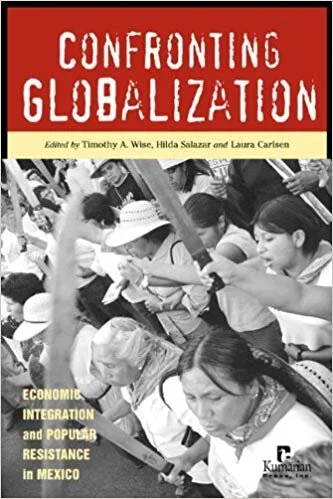In 30 years of research and writing, Wise has published an extensive range of books, articles, and reports, most while working as a Senior Researcher at Tufts University’s Global Development and Environment Institute (GDAE). Others come from his time directing the Land and Food Rights Program at Small Planet Institute, including articles written while researching his book, Eating Tomorrow. This is the most comprehensive collection of his writings sorted into the main areas of his work.
books
Articles & Reports
Land and food rights in Africa
Wise’s research for Eating Tomorrow took him to Southern Africa, where the battles for the future of food are urgent. Peasant farmers fight land-grabbing and defend their rights to save, exchange, and sell their seeds in the face of pressure from those advocating a “Green Revolution for Africa.” Those farmers’ low-cost, nutritious, and climate-resilient alternatives point the way forward in a climate-constrained world.
Feeding the World: Myths & facts
Since world crop prices spiked in 2007-8, sparking food riots in many parts of the world, we have seen a new wave of warnings that growing populations in developing countries will outstrip the resources available to feed them. It remains true that we grow more than enough food now to feed everyone, that industrial agriculture worsens climate change while undermining current food producers, and that the solutions to hunger and climate change lie in supporting those farmers to develop climate-resilient sustainable farms that grow a diversity of crops as they rebuild their depleted soils.
Latin America & Rural Development
Wise has been working and writing on Latin America since the 1980s. The Globalization and Sustainable Development Program that he founded at Tufts University’s Global Development and Environment Institute two decades ago focused heavily on Mexico under the North American Free Trade Agreement and trade liberalization in Latin America.
Trade and Global Governance
Rich-country governments have long promoted trade rules that favor multinational agricultural export firms, from the North American Free Trade Agreement (NAFTA) to the World Trade Organization. Such policies have resulted in the widespread “dumping” of below-cost agricultural exports on developing countries, undermining local farmers with unfair competition.
U.S. Agricultural Policies
Since 2000, Wise has focused on U.S. agricultural policies and their impacts on farmers in developing countries. His research has shown that U.S. agricultural subsidies are not the primary cause of agricultural dumping and that the main beneficiaries are not U.S. farmers but agribusiness firms that see high sales and low prices for crops. This has fed the rise of industrial livestock firms that get an “implicit subsidy” for their feed costs.
Excerpts from Eating Tomorrow
Getting Smart about Climate and Agriculture - Opening to Eating Tomorrow
Chapter 1: Introduction - Eating Tomorrow
The Gospel According to Agribusiness - Abridged from Chapter 5 (Iowa), via Real Food Media
"NAFTA’s Rural Legacy: Dumping, Displacement, and Dependency" - From Chapter 8 (Mexico)
NAFTA’s Assault on Mexico’s Indigenous Farmers - Excerpt from Eating Tomorrow (New Press 2019), Chapter 8
Resisting GMOs and Preserving Indigenous Culture in Rural Mexico - From Chapter 8 (Mexico), via Yes! Magazine
Eating Tomorrow: The Battle for the Future of Food - Adapted from the conclusion to Eating Tomorrow
Confronting Globalization (Note: Also published in Spanish.)
Survey of Sustainable Development
Catalog
Books
Eating Tomorrow
Eating Tomorrow excerpts
Articles and Reports
Land and Food Rights in Africa
Agroecology vs. Green Rev
Mozambique
Malawi
Zambia
Tanzania
Feeding the World
World Hunger
Climate Change
2007-8 Crisis and Response
Agroecology vs. Green Rev
Financial Speculation
Biofuels
Depolarizing the GMO Debate
Latin America & Rural Dev
Working Group Projects
Revaluing Small-Scale Farms
GM Corn in Mexico
Trade and Global Governance
Mexico under NAFTA
WTO & Trade Governance
Other Trade Agreements
U.S. Agricultural Policies
Beyond Agricultural Subsidies
Agricultural Dumping
Feeding the Factory Farm
Corporate Concentration
Podcasts/Videos
Invite Tim to Speak
Follow Tim on Twitter



